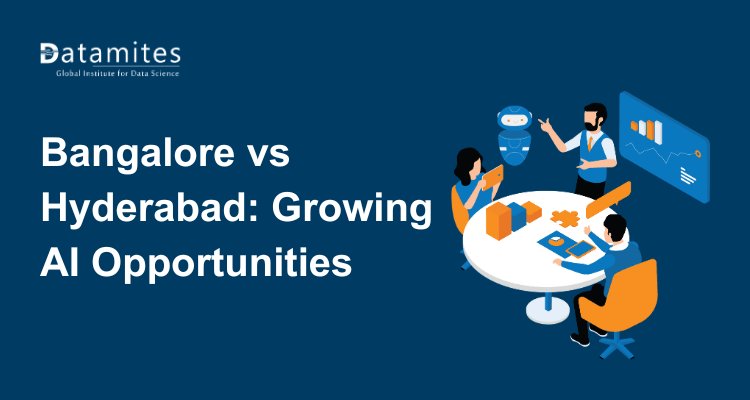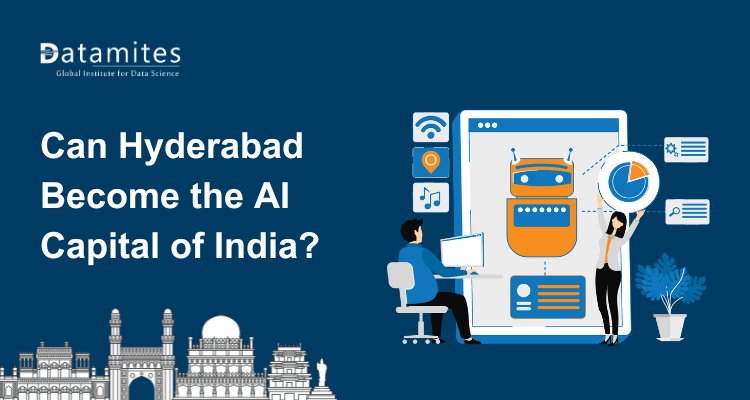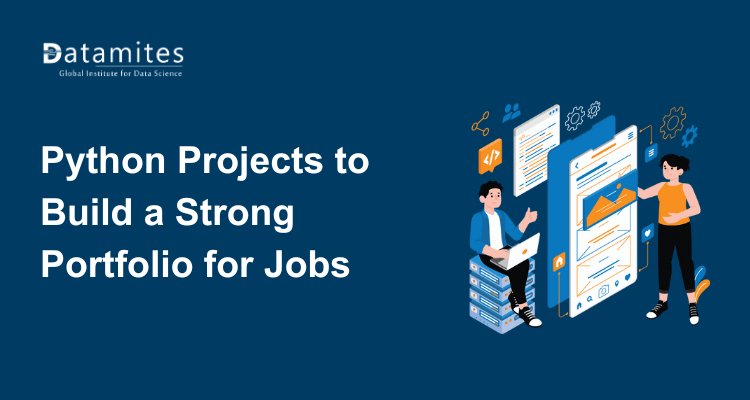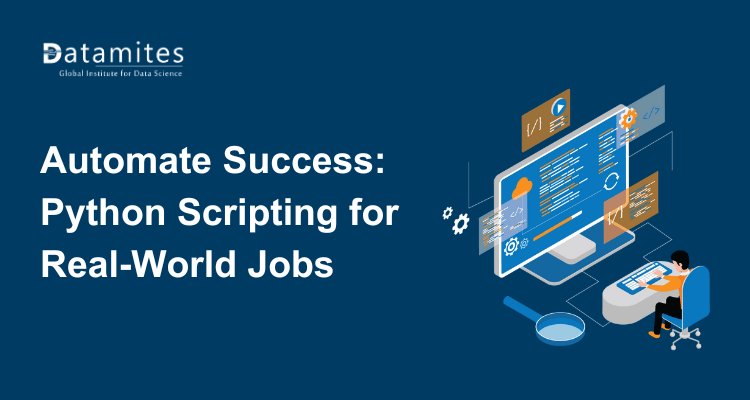7 Top Data Analytics Trends in 2024
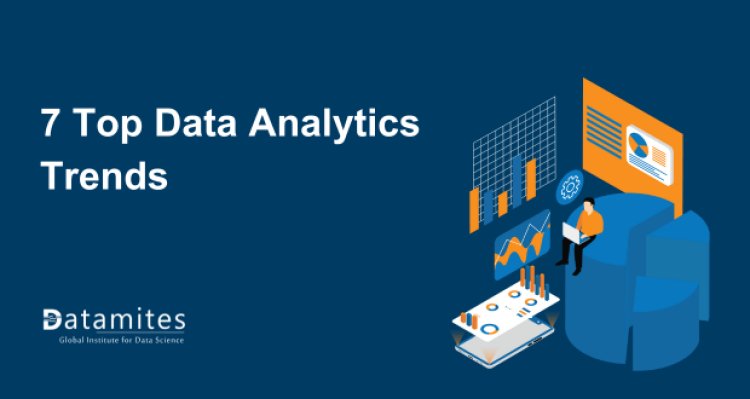
Data analytics continues to transform rapidly, driving innovations that impact every industry. As we move into 2024, new trends are emerging that shape the field’s trajectory, creating fresh opportunities for those pursuing a career in data analytics. From AI-powered insights to sustainability-focused data practices, these trends are redefining how organizations approach data for better decision-making.
If you’re considering a Data Analytics course or Data Analytics certification course, understanding these trends will provide valuable insights into the skills and knowledge areas that will be crucial in the near future. Here’s a look at seven significant trends set to shape data analytics in 2024.
Refer these articles:
- How to Use Statistical Methods in Data Analytics
- Best Practices for Data Analysts in Data Visualization
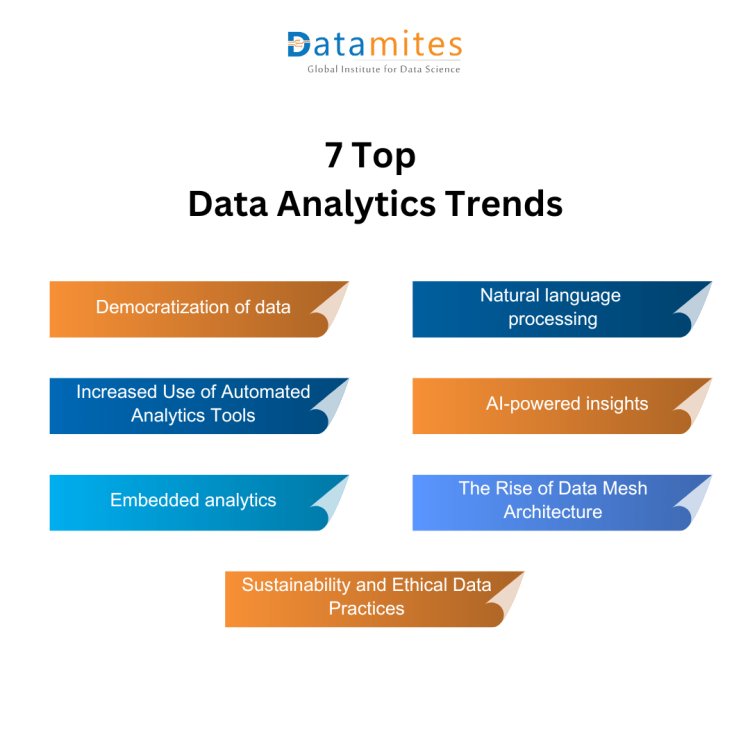
Top 7 Trends in Data Analytics
Data analytics is evolving rapidly, reshaping industries, driving strategic decisions, and creating new growth opportunities. With the ongoing surge of digital transformation, companies across sectors are looking to leverage data for insights that offer competitive advantages. Here’s a closer look at the top seven data analytics trends making waves this year.
1. Democratization of Data
Data democratization ensures that data is accessible to anyone within an organization, regardless of technical background. By breaking down barriers, data democratization is empowering employees at all levels to access and interpret data confidently.
- Enhanced Collaboration: With more individuals understanding and using data, cross-departmental collaboration strengthens, fostering innovation.
- Reduced Reliance on IT: Employees can independently make data-informed decisions without heavy IT involvement, allowing IT to focus on more strategic initiatives.
- Increased Demand for Training: Organizations are investing in Data Analytics training to ensure employees are equipped to work with data, which is leading to more inclusive, data-driven decision-making.
This trend not only improves efficiency but also highlights the need for accessible tools and training programs, such as a Top Data Analytics training institute offering comprehensive courses to meet this rising demand.
2. AI-Powered Insights
Artificial Intelligence (AI) is reshaping data analytics by enhancing how we generate insights. AI-driven analytics tools use machine learning algorithms to uncover patterns, detect anomalies, and predict future outcomes with precision.
- Automated Pattern Recognition: AI reduces human error by automating the recognition of trends, correlations, and outliers in massive datasets.
- Predictive Analytics: AI-enabled tools can forecast trends based on historical data, providing businesses with a competitive advantage.
- Boosting Data Analytics Careers: A Data Analytics certification course with a focus on AI is becoming invaluable for those aiming to stay competitive in this evolving field.
As organizations look to leverage AI for smarter decision-making, professionals skilled in AI-powered data analytics will find increasing career opportunities. This trend reinforces the importance of investing in Data Analytics training that includes AI-focused modules.
3. Embedded Analytics
Embedded analytics involves incorporating data analysis capabilities into commonly used applications. By embedding analytics directly into tools employees already use, organizations enable faster access to insights.
- Streamlined Workflows: Teams no longer need to switch between platforms, as data insights are embedded directly within the software they use.
- Improved User Experience: Embedded analytics ensures that users have access to context-specific data, enhancing productivity and decision-making.
- Growing Relevance in Data Analytics Courses: Today’s Data Analytics course offerings emphasize embedded analytics, preparing students to understand the tools and techniques needed for successful integration.
This trend is particularly beneficial for companies looking to maximize productivity, as it empowers employees to make data-backed decisions without the need to navigate complex systems.
4. Natural Language Processing
Natural Language Processing (NLP) simplifies data interaction by allowing users to query data using everyday language. As NLP technology advances, it becomes easier for non-experts to explore data insights without needing specialized skills.
- User-Friendly Data Access: NLP-powered analytics tools enable anyone to request data insights using simple language, making data access faster and more intuitive.
- Enhanced Customer Insights: NLP is also being used to analyze customer sentiment from social media, reviews, and other text-based data, allowing for more personalized strategies.
- Growing NLP Demand in Data Analytics Careers: A career in Data Analytics is increasingly requiring skills in NLP, as more organizations adopt this technology for customer-focused applications.
As NLP capabilities expand, the field of data analytics is becoming more inclusive, aligning with the industry’s drive toward democratization.
5. Increased Use of Automated Analytics Tools:
Automation is transforming data analytics by reducing the need for manual analysis, allowing teams to derive insights faster and focus on strategic tasks. Automated tools streamline everything from data cleaning to report generation.
- Efficiency and Time Savings: Automation reduces the time spent on repetitive tasks, freeing analysts to focus on interpreting insights and making recommendations.
- Higher Data Accuracy: Automated tools decrease the risk of human error in data processing, resulting in more reliable analysis.
- Opportunity for Upskilling: A Top Data Analytics institute might offer specialized courses on automation, preparing students for roles that prioritize efficiency.
This trend is making data analytics more efficient, underscoring the value of automation skills in any Data Analytics certification course for those seeking to stay relevant in a tech-driven workplace.
6. The Rise of Data Mesh Architecture:
Data mesh is an architectural approach that decentralizes data management by assigning data ownership to specific business domains. Instead of data being managed centrally, teams across an organization maintain control over their data.
- Increased Agility: By decentralizing data ownership, organizations can respond to changes faster, as individual teams are empowered to manage and analyze their data.
- Enhanced Data Governance: Data mesh promotes better data quality by holding individual teams accountable for their data’s integrity.
- Essential Knowledge for Data Analysts: Understanding data mesh architecture is becoming crucial in the field, and many Data Analytics training programs now cover this topic in-depth.
This trend signifies a shift towards a more flexible, scalable data management system that supports rapid growth and adaptability, making it an essential area of study for data analysts in 2024.
7. Sustainability and Ethical Data Practices:
With rising awareness of environmental impact and ethical standards, companies are focusing on sustainable and ethical data practices. This trend emphasizes transparency, privacy, and minimizing environmental impact.
- Privacy-First Approach: Organizations are adopting stricter privacy standards, ensuring user data is protected and transparently managed.
- Environmental Considerations: Sustainability initiatives are pushing companies to reduce the energy consumed by data storage and processing.
- Ethics in Data Analytics: Modern Data Analytics courses include modules on ethical considerations, preparing professionals to make responsible data-driven decisions.
This shift towards sustainable data analytics aligns with the growing public demand for transparency and responsibility, particularly as industries grapple with concerns over data privacy and environmental sustainability.
Refer these articles:
Data analytics trends in 2024 showcase the field’s rapid evolution, making it an exciting time for those exploring a career in data analytics. With advancements in AI, NLP, and ethical practices, data analytics is set to become more accessible, intelligent, and responsible. Staying updated on these trends through relevant Data Analytics certification courses will help you remain competitive and adaptable in this dynamic field.
DataMites Institute is a leading provider of professional training in data science and analytics. Their Certified Data Analyst Course is designed to equip learners with essential skills in data interpretation and analysis. In partnership with respected organizations like IABAC and NASSCOM FutureSkills, DataMites offers industry-recognized certifications that enhance career prospects. The institute provides a diverse range of courses, including Artificial Intelligence, Data Science, Machine Learning, and Python Programming. Each program is tailored to meet the evolving demands of the tech industry, strengthening career opportunities and technical expertise.

